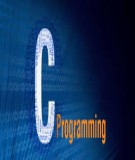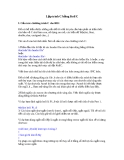Operator Overloading
Objectives
• Discuss operator overloading
– definition – use – advantages – limitations
• Present type conversion operators
2
Arithmetic operations
• Could define a method to perform arithmetic operation
– supply as part of class or struct
struct Point {
int x; int y;
add points
public static Point Add(Point p, Point q) {
return new Point(p.x + q.x, p.y + q.y);
} ...
}
Point a = new Point(1, 2); Point b = new Point(3, 4);
invoke Add Point c = Point.Add(a, b);
3
Operator overloading
• Can overload operators to work with class and struct types
– use keyword operator – follow with symbol
struct Point {
int x; int y;
overload +
public static Point operator+(Point p, Point q) {
return new Point(p.x + q.x, p.y + q.y);
} ...
}
4
Using overloaded operator
• Overloaded operator used like operators for other types
– compiler translates into method call
Point a = new Point(1, 2); Point b = new Point(3, 4);
use operator+
Point c = a + b;
5
Advantages of operator overloading
• Operator overloading yields advantages for user code
– concise – readable – takes advantage of user's existing knowledge of symbol
Point a = new Point(1, 2); Point b = new Point(3, 4);
operator
Point c = a + b;
method
Point d = Point.Add(a, b);
6
Binary operators
• Binary operators take two parameters
struct Point {
int x; int y;
binary +
public static Point operator+(Point p, Point q) {
return new Point(p.x + q.x, p.y + q.y);
}
binary -
public static Point operator-(Point p, Point q) {
return new Point(p.x - q.x, p.y - q.y);
} ...
}
7
Unary operators
• Unary operators take single parameter
struct Point {
int x; int y;
unary +
public static Point operator+(Point p) {
return new Point(p.x, p.y);
}
unary -
public static Point operator-(Point p) {
return new Point(-p.x, -p.y);
} ...
}
8
Mixed types
• Can mix parameter types
– separate method for each combination of parameter type/order
struct Point {
Point*int
public static Point operator*(Point p, int a) {
return new Point(p.x * a, p.y * a);
}
int*Point
public static Point operator*(int a , Point p) {
return new Point(a * p.x, a * p.y);
} ...
}
9
Equality
• Can overload equality and inequality
– should ensure Equals method has same semantics
struct Point {
equality
public static bool operator==(Point p, Point q) {
return p.x == q.x && p.y == q.y;
inequality
} public static bool operator!=(Point p, Point q) {
return !(p == q);
} ...
}
Point a = new Point(1, 2); Point b = new Point(3, 4);
compare points if (a == b) ...
10
Operator pairs
• Some operators are required to be present in pairs
– == and != – > and < – >= and <= – true and false
struct Point {
equality
public static bool operator==(Point p, Point q) {
return p.x == q.x && p.y == q.y;
} ... error, must also provide inequality }
11
Compound assignment
• Compound assignment operator provided automatically
– when corresponding binary operator overloaded
struct Point {
define binary+
public static Point operator+(Point p, Point q) {
return new Point(p.x + q.x, p.y + q.y);
} ...
}
Point a = new Point(1, 2); Point b = new Point(3, 4); Point c;
get operator+ c = a + b;
c += b; get operator+=
12
Method format
• Overloaded operator must be member of class or struct • Must have specific modifiers
– public – static
struct Point {
int x; int y;
required modifiers
public static Point operator+(Point p, Point q) {
return new Point(p.x + q.x, p.y + q.y);
} ...
}
13
Parameter types
• At least one parameter must be of enclosing type – prevents redefinition of operators on existing type
struct Point {
int x; int y;
error
public static Point operator+(int x, int y) {
return new Point(x, y);
} ...
}
14
Limitations
• Only some operators can be overloaded
– unary: + - ! ~ ++ -- true false – binary: + - * / % & | ^ << >> == != > < >= <=
• Cannot
– create new operators – change precedence – change associativity – change number of arguments – overload prefix/postfix versions separately – pass parameters ref or out
15
Cross language
• Not all .NET languages support operator overloading
– operators therefore not available to clients in all languages – should provide regular method in addition to operator
struct Point {
provide operator
public static Point operator+(Point p, Point q) {
return Add(p, q);
}
provide method
public static Point Add(Point p, Point q) {
return new Point(p.x + q.x, p.y + q.y);
} ...
}
16
Type conversion operators
• Can overload the type conversion operators – implement user defined type converters – invoke automatically or using cast syntax
Rational: 1/2 double: 0.5
int: 3 Rational: 3/1
Polar: (1, 3.14) Cartesian: (-1, 0)
17
Converter syntax
• Define converter using keyword operator
– operator name is destination type of conversion – parameter is source of conversion
struct Cartesian {
... public static operator Cartesian(Polar p) { ... } explicit implicit }
required required required choose one destination source
18
Implementing converter
• Converter should create and return object of destination type
– using data in source
struct Cartesian {
int x; int y;
public static explicit operator Cartesian(Polar p) {
Cartesian c = new Cartesian();
create object of destination type
convert data
c.x = p.r * Math.Cos(p.theta); c.y = p.r * Math.Sin(p.theta);
return c;
return new object
} ...
}
19
Converter uses
• Converter can be used whenever conversion required
– assignment – parameter passing – method return
20
Explicit
• Explicit converters must be invoked using cast
– safest choice – requires user to acknowledge type conversion with cast
struct Cartesian {
explicit converter
public static explicit operator Cartesian(Polar p) {
...
} ...
}
Polar p = new Polar(1, Math.PI);
cast required
Cartesian c = (Cartesian)p;
21
Implicit
•
Implicit converter automatically used by compiler as needed – makes user code minimal – but can make code more difficult to understand – often recommended only if no information is lost in conversion
struct Cartesian {
implicit converter
public static implicit operator Cartesian(Polar p) {
...
} ...
}
Polar p = new Polar(1, Math.PI);
no cast required











![Đề thi kết thúc học phần Lập trình web 1 [năm] [khóa]](https://cdn.tailieu.vn/images/document/thumbnail/2026/20260226/hoatrami2026/135x160/69841772100240.jpg)














